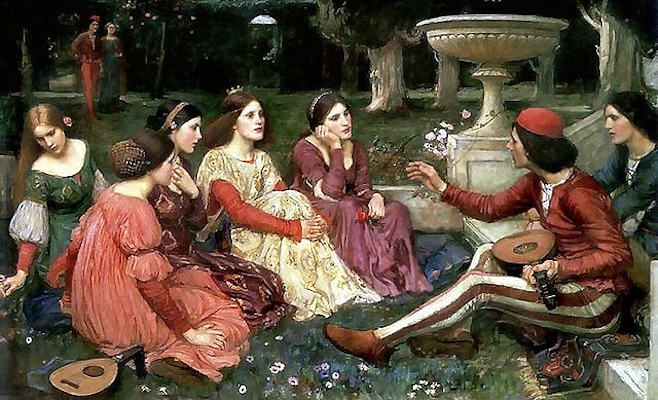
La Biografia
Giovanni Boccaccio, una delle grandi figure della letteratura italiana, è nato il 16 giugno 1313 a Certaldo o Firenze, in Italia. Suo padre era Boccaccino di Chellino, un mercante, e sua madre era probabilmente una donna di discendenza parigina, che il padre di Boccaccio non ha mai sposato.
Nella sua gioventù, Boccaccio fu mandato a Napoli per studi commerciali, probabilmente presso l’Università di Napoli. Tuttavia, la sua passione era sempre stata la letteratura, e iniziò a scrivere seriamente mentre viveva lì.
Boccaccio è famoso per la sua opera fondamentale, “Il Decameron”, una raccolta di 100 racconti raccontati da un gruppo di sette donne e tre uomini che sono fuggiti dalla città di Firenze per sfuggire alla Peste Nera. Le storie, che abbracciano una varietà di temi dall’amore alla tragedia all’umorismo, sono considerate capolavori della prosa classica italiana.
“Il Decameron” non è solo un capolavoro di narrazione e caratterizzazione, ma anche una critica pungente della società. La storia cornice dei dieci individui in fuga dalla peste serve da sfondo a racconti che espongono avarizia, ipocrisia e vizio, celebrando al contempo intelligenza, virtù e amore. Ha segnato una deviazione dalla letteratura allegorica e morale del tempo, concentrandosi maggiormente sulla rappresentazione realistica della natura umana.
In “Il Decameron”, Boccaccio ha dimostrato una profonda intuizione della natura umana e della società, con un talento per una narrazione vivida e coinvolgente. Il suo stile ha influenzato notevolmente il Rinascimento italiano e scrittori come Geoffrey Chaucer.
Boccaccio ebbe un’importante amicizia con il famoso poeta italiano Petrarca, che influenzò molto le sue opere successive. Ha anche dedicato gran parte della sua carriera alla compilazione di opere enciclopediche di biografia e mitologia, come “De Casibus Virorum Illustrium” (Sul destino degli uomini famosi) e “De Mulieribus Claris” (Sulle donne famose), entrambe influenti al loro tempo.
Boccaccio non si è mai sposato, ma ha avuto una lunga relazione con una donna a cui si riferiva come “Fiammetta” nelle sue opere.
La vita di Boccaccio è stata segnata da varie difficoltà, tra cui la morte del padre e della matrigna durante la Peste Nera e la sua lotta con la chiesa per la licenziosità della sua opera.
Morì il 21 dicembre 1375 a Certaldo.
La statua a Certaldo, creata da Giovanni Dupré, mostra Boccaccio con un libro tra le mani, a simboleggiare i suoi significativi contributi alla letteratura. La città ospita anche un museo dedicato alla sua vita e alle sue opere, consolidando ulteriormente la sua eredità come uno dei padri della letteratura italiana.
(Testo generato da ChatGPT4, giugno 2023. Revisione contenuti e formattazione a cura di Manuela Filomena)
Biography
Giovanni Boccaccio, one of the great figures of Italian literature, was born on June 16, 1313, in Certaldo or Florence, Italy. His father was Boccaccino di Chellino, a merchant, and his mother was likely a woman of Parisian descent, who Boccaccio’s father never married.
As a youth, Boccaccio was sent to Naples for business studies, likely at the University of Naples. However, his passion was always literature, and he began writing in earnest while living there.
Boccaccio is famous for his seminal work, “The Decameron,” a collection of 100 tales told by a group of seven women and three men who have fled the city of Florence to escape the Black Death. The stories, encompassing a variety of themes from love to tragedy to humor, are considered masterpieces of classical Italian prose.
“The Decameron” is not only a masterpiece of narrative and character but also a witty critique of society. The frame story of ten individuals fleeing the plague serves as a backdrop for tales that expose greed, hypocrisy, and vice, while also celebrating intelligence, virtue, and love. It marked a departure from the allegorical and moral literature of the time, focusing more on portraying human nature realistically.
In “The Decameron,” Boccaccio demonstrated a keen insight into human nature and society, with a flair for vivid and entertaining storytelling. His style greatly influenced the Italian Renaissance and writers like Geoffrey Chaucer.
Boccaccio had a significant friendship with the famous Italian poet Petrarch, which heavily influenced his later works. He also devoted a great deal of his career to compiling encyclopedic works of biography and mythology, such as “De Casibus Virorum Illustrium” (On the Fates of Famous Men) and “De Mulieribus Claris” (On Famous Women), both influential in their time.
Boccaccio never married but had a long-standing relationship with a woman he referred to as “Fiammetta” in his works.
Boccaccio’s life was marked by various hardships, including the death of his father and stepmother during the Black Death and his struggle with the church over his work’s licentiousness.
He died on December 21, 1375, in Certaldo.
The statue in Certaldo, created by Giovanni Dupré, shows Boccaccio with a book in his hands, symbolizing his significant contributions to literature. The city also houses a museum dedicated to his life and works, further cementing his legacy as one of the fathers of Italian literature.
(Text generated by ChatGPT4, June 2023. Edited for style and content by R.H. Ruggles)
Risorse Internet

